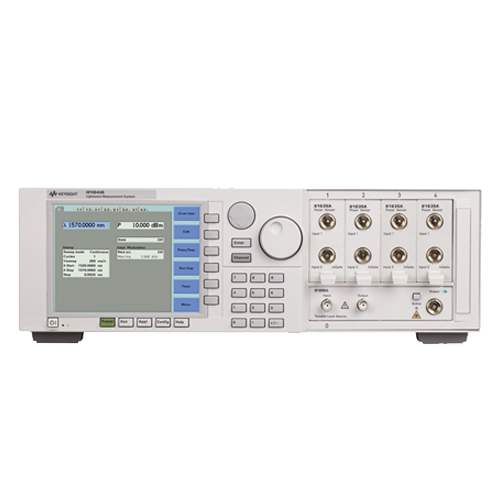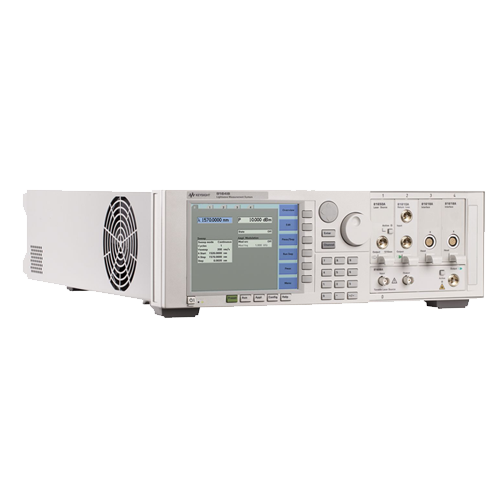81608A keysight tunable laser source, high power
There are three broad principles for achieving laser wavelength tuning. Most tunable lasers use an operating substance with a broad fluorescence spectral line. The resonant cavity that makes up the laser has very low losses only in a very narrow wavelength range.
The first is to change the wavelength of the laser by changing the wavelength corresponding to the low-loss region of the resonant cavity by some element (e.g., a grating).
The second is to shift the energy level of the laser jump by changing certain external parameters (e.g. magnetic field, temperature, etc.).
The third kind is to use nonlinear effects to achieve wavelength transformation and tuning (see nonlinear optics, excited Raman scattering, optical difrequency, optical parametric oscillation).
Typical lasers that belong to the first type of tuning are dye lasers, chrysoberyl lasers, color-centered lasers, tunable high-pressure gas lasers, and tunable excimer lasers.

Model: 81608A
Name: Tunable laser source
Brand:KEYSIGHT
Category: General Electronic Test >Tunable Laser Source
Product attributes: Mainframe
Function
Wavelength: 1240-1380 nm or 1340-1495 nm or 1450-1650 nm or 1490-1640 nm
Scanning speed: up to 200 nm/s, bidirectional
Maximum power: > +12 dBm peak typical (options 114, 116, 216) or > +13 dBm peak typical (option 113)
Signal to SSE ratio: ≥ 75 dB/nm typical
Absolute wavelength accuracy: ±5 pm (static), ±10 pm (scanned) typical

The Keysight 8160xA tunable laser sources are designed with a common cavity laser module. They share a narrow linewidth and low spontaneous emission level to achieve excellent spectral loss measurement range in both the stopband and passband when used with the Keysight N774xA multi-port power meter or the Keysight 816xxx power meter module.
The built-in gas chamber and self-adjustment features ensure excellent long-term stability to minimize cost of ownership. Within the 8160xA series, cost-effective models and base models provide additional cost-effective options in terms of output power, tuning mode and speed, wavelength accuracy, and repeatability.
The 81608A cost-effective tunable laser source module delivers peak output power in excess of +12 dBm, at least 75 dB/nm above its spontaneous emission level. It performs bi-directional scanning up to 200 nm/s with typical wavelength repeatability of ±1.5 pm. This laser source offers a good balance of functional characteristics, performance and price, making it suitable for coherent transmission experiments and cost-effective component testing on the production line.
The 81608A tunable laser source is supported by the N7700A optical communications application software suite and, when used in conjunction with power meters and polarization instruments, can measure spectral characteristics such as insertion loss, polarization dependent loss and dispersion. They provide excellent scanning wavelength accuracy and dynamic range.
Also consider the new N7778C tunable laser source for a more compact model.
There are three broad principles for achieving laser wavelength tuning. Most tunable lasers use an operating substance with a broad fluorescence spectral line. The resonant cavity that makes up the laser has very low losses only in a very narrow wavelength range.
The first is to change the wavelength of the laser by changing the wavelength corresponding to the low-loss region of the resonant cavity by some element (e.g., a grating).
The second is to shift the energy level of the laser jump by changing certain external parameters (e.g. magnetic field, temperature, etc.).
The third kind is to use nonlinear effects to achieve wavelength transformation and tuning (see nonlinear optics, excited Raman scattering, optical difrequency, optical parametric oscillation).
Typical lasers that belong to the first type of tuning are dye lasers, chrysoberyl lasers, color-centered lasers, tunable high-pressure gas lasers, and tunable excimer lasers.

Model: 81608A
Name: Tunable laser source
Brand:KEYSIGHT
Category: General Electronic Test >Tunable Laser Source
Product attributes: Mainframe
Function
Wavelength: 1240-1380 nm or 1340-1495 nm or 1450-1650 nm or 1490-1640 nm
Scanning speed: up to 200 nm/s, bidirectional
Maximum power: > +12 dBm peak typical (options 114, 116, 216) or > +13 dBm peak typical (option 113)
Signal to SSE ratio: ≥ 75 dB/nm typical
Absolute wavelength accuracy: ±5 pm (static), ±10 pm (scanned) typical

The Keysight 8160xA tunable laser sources are designed with a common cavity laser module. They share a narrow linewidth and low spontaneous emission level to achieve excellent spectral loss measurement range in both the stopband and passband when used with the Keysight N774xA multi-port power meter or the Keysight 816xxx power meter module.
The built-in gas chamber and self-adjustment features ensure excellent long-term stability to minimize cost of ownership. Within the 8160xA series, cost-effective models and base models provide additional cost-effective options in terms of output power, tuning mode and speed, wavelength accuracy, and repeatability.
The 81608A cost-effective tunable laser source module delivers peak output power in excess of +12 dBm, at least 75 dB/nm above its spontaneous emission level. It performs bi-directional scanning up to 200 nm/s with typical wavelength repeatability of ±1.5 pm. This laser source offers a good balance of functional characteristics, performance and price, making it suitable for coherent transmission experiments and cost-effective component testing on the production line.
The 81608A tunable laser source is supported by the N7700A optical communications application software suite and, when used in conjunction with power meters and polarization instruments, can measure spectral characteristics such as insertion loss, polarization dependent loss and dispersion. They provide excellent scanning wavelength accuracy and dynamic range.
Also consider the new N7778C tunable laser source for a more compact model.







